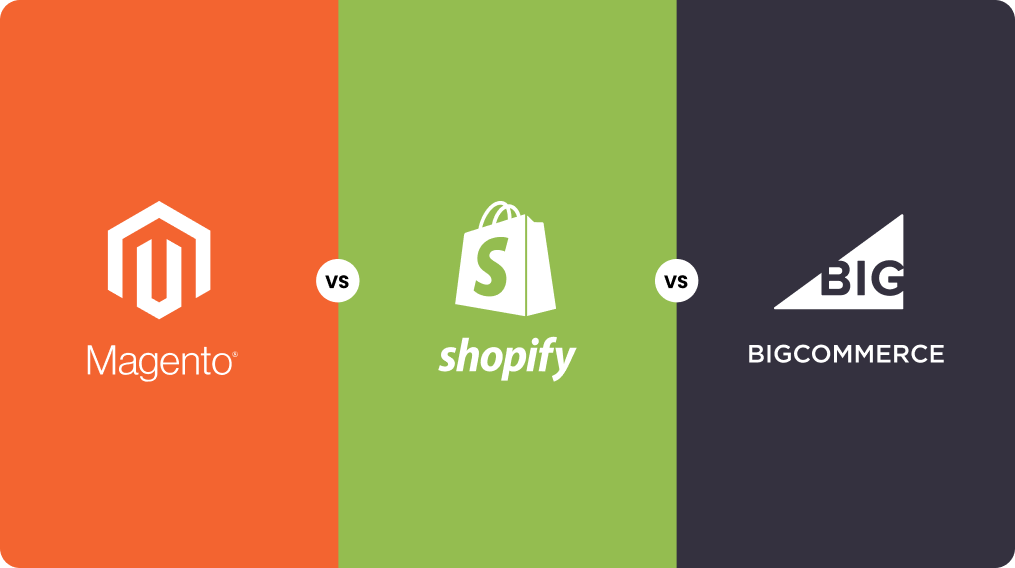Let’s Talk.
Start with a conversation. From there, we can build a plan.

In the world of eCommerce, choosing the right platform is crucial for the success of your online store. Adobe Magento, Shopify, and BigCommerce are three of the most popular eCommerce platforms on the market, each offering its own unique features and benefits. In this article, we will compare these three platforms in terms of pricing, ease of use, features, customization options, SEO friendliness, payment gateway options, customer support, security, scalability, integrations, and more, to help you make an informed decision for your business.
When it comes to pricing, Shopify and BigCommerce offer more straightforward pricing plans compared to Adobe Magento, which has a more complex pricing structure. Shopify’s plans start at $29 per month, while BigCommerce’s plans start at $29.95 per month. Magento, on the other hand, offers a free Community Edition but has a more expensive Enterprise Edition with pricing based on the size of your business.
Hidden costs can significantly impact the total cost of ownership for an eCommerce platform. Here’s how each platform stacks up in terms of potential hidden costs:
It’s important to carefully evaluate these potential hidden costs when choosing an eCommerce platform to ensure that it aligns with your budget and business needs. Talk to an experienced partner to evaluate total cost of ownership and what platform best suits your needs.
In terms of ease of use, Shopify is often considered the most user-friendly platform, with a simple and intuitive interface. BigCommerce also offers a user-friendly interface, but some users may find it slightly more complex than Shopify. Magento, on the other hand, is known for its steep learning curve and may require more technical knowledge to set up and manage.
All three platforms offer a wide range of features to help you create and manage your online store. Shopify is known for its extensive app store, which allows you to add additional features and functionality to your store. BigCommerce offers a similar app marketplace, but with fewer options compared to Shopify. Magento, on the other hand, is known for its robust set of features out of the box, with less reliance on third-party apps.
When it comes to customization, Magento offers the most flexibility, allowing you to customize almost every aspect of your store. Shopify also offers a high level of customization, with a wide range of themes and apps available. BigCommerce, while offering some customization options, is more limited compared to Magento and Shopify.
In terms of SEO friendliness, all three platforms offer tools and features to help improve your store’s search engine rankings. Shopify and BigCommerce both offer built-in SEO tools, such as customizable meta tags and URL structures. Magento also offers robust SEO capabilities, with features like SEO-friendly URLs and sitemaps.
When it comes to payment gateway options, all three platforms offer a wide range of choices, including popular options like PayPal, Stripe, and Square. However, Shopify stands out for its seamless integration with multiple payment gateways, making it easy for customers to pay for their purchases.
In terms of customer support, Shopify and BigCommerce offer 24/7 customer support via phone, email, and live chat. Magento, on the other hand, offers more limited support options, with support primarily available through its community forums and documentation.
When it comes to security, all three platforms offer robust security measures to protect your store and customer data. Shopify and BigCommerce are both PCI compliant, ensuring that your store meets the highest security standards. Magento also offers strong security features, but as a self-hosted platform, you are responsible for ensuring your server is secure.
In terms of scalability, all three platforms are capable of handling large volumes of traffic and transactions. However, Magento is often considered the most scalable platform, with the ability to handle complex and high-traffic stores more effectively than Shopify and BigCommerce.
When it comes to integrations, Shopify and BigCommerce offer a wide range of integrations with third-party apps and services. Magento also offers a range of integrations, but as an open-source platform, it requires more technical knowledge to implement and manage these integrations.
Shopify
BigCommerce
Magento
In conclusion, choosing the right eCommerce platform depends on your specific needs and requirements. Shopify is a great choice for small to medium-sized businesses looking for an easy-to-use platform with a wide range of features. BigCommerce offers a similar experience but with a slightly steeper learning curve. Magento is the best choice for larger businesses with more complex requirements, thanks to its high level of customization and scalability.
Start with a conversation. From there, we can build a plan.
